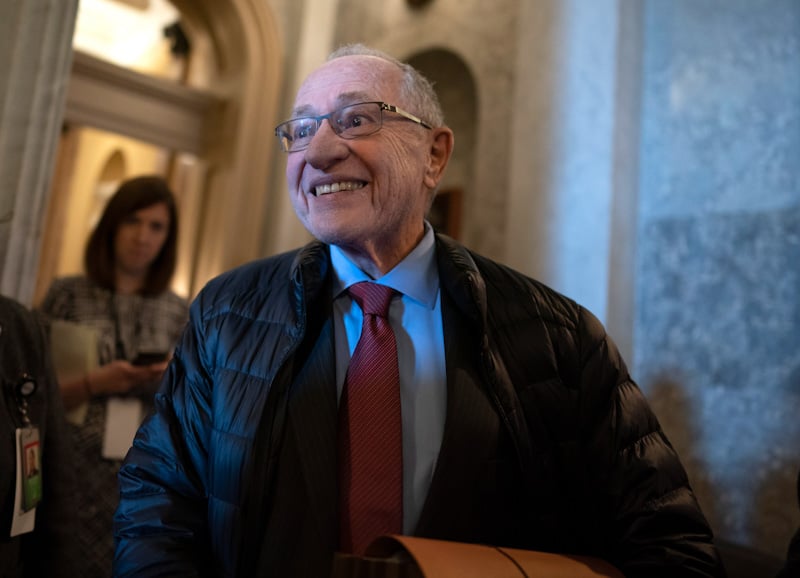Dershowitz vows to take $12,200 sanction in voting suit to Supreme Court if necessary

An Arizona judge has said Alan Dershowitz is jointly and severally liable for up to 10% of a total $122,200 sanction for attorney fees incurred by Maricopa County, Arizona, in fighting an election-related lawsuit. Photo by J. Scott Applewhite/The Associated Press.
Retired Harvard Law School professor Alan Dershowitz must pay up to $12,220 as a sanction in a tossed lawsuit that sought to ban the use of voting machines in Arizona in 2022.
In a July 14 order, U.S. District Judge John J. Tuchi of the District of Arizona said Dershowitz is jointly and severally liable for up to 10% of a total $122,200 sanction for attorney fees incurred by Maricopa County, Arizona, in fighting the suit.
The Arizona Capitol Times and Reuters have coverage.
The suit by failed Republican Arizona gubernatorial candidate Kari Lake and failed Republican Arizona secretary of state candidate Mark Finchem contended that voting machines that tabulate paper ballots can be inaccurate.
After Tuchi tossed the case, Maricopa County sought sanctions for false allegations that raised doubts about the trustworthiness of Arizona elections. Tuchi agreed that some suit claims were sanctionable and said the lawyers for the plaintiffs “acted at least recklessly.”
Dershowitz said he shouldn’t have to pay sanctions because he provided legal advice on constitutional issues in an of counsel capacity to other lawyers in the case. He estimates that he provided only “three or four hours” of work.
According to Dershowitz, he “had no input on the decision to bring suit and has no opinion on whether voting machines are vulnerable to hacking, which was one of the central claims underlying this case,” Tuchi wrote.
Instead, Dershowitz formulated one paragraph of the first amended complaint alleging that software companies “refuse to disclose their software and system components and subject them to neutral expert evaluation.”
Two other lawyers in the case, Andrew D. Parker and Kurt B. Olsen, are jointly and severally responsible for paying the $122,200 sanction, along with their law firms, Tuchi said.
Dershowitz identified himself as of counsel when he signed the complaint and first amended complaint. But subsequent filings listed Dershowitz as “counsel,” which was an “administrative oversight,” according to Parker. Dershowitz also sought admission to practice in Arizona as pro hac vice.
Tuchi said no matter how Dershowitz signed court documents, the effect of his signature was to create the impression that he endorsed the suit claims.
Tuchi said other courts have sanctioned lawyers who had limited involvement in the case. He cited a recent decision by the 6th U.S. Circuit Court of Appeals at Cincinnati-based that held several lawyers responsible for baseless claims in a vote-fraud suit, including a lawyer who argued that he shouldn’t be responsible because he acted in an of counsel capacity.
Dershowitz told the Arizona Capitol Times that he will appeal “all the way up to the Supreme Court.” He thinks that the decision threatens legal experts who serve only as legal consultants in suits.
“I will not accept any ruling that says I owe a single penny,” he said.
He gave a similar statement to Reuters and said he did nothing wrong.
Parker and Olsen are also planning an appeal. They contend that there is no basis for sanctions.



